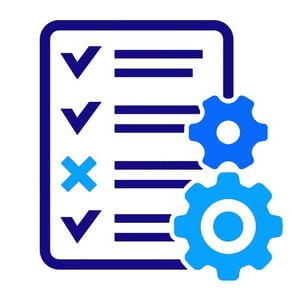 In our May blog, we pointed out that there are very few regulations found in the FAR & DFARS that address labor recording, otherwise known as timekeeping. Therefore, it would stand to reason that Government Contractors have some leeway when reducing to writing their own rules with regard to timekeeping. After all, it is the regulations and not guidance that DCAA can enforce.
In our May blog, we pointed out that there are very few regulations found in the FAR & DFARS that address labor recording, otherwise known as timekeeping. Therefore, it would stand to reason that Government Contractors have some leeway when reducing to writing their own rules with regard to timekeeping. After all, it is the regulations and not guidance that DCAA can enforce.
Be it regulations or guidance, the guidance found under Labor Charging System in the DCAA Manual 7641.90 would appear to consist of perfect material for inclusion in a labor-intensive Government Contractor's written policies and procedures. The recommended policies and procedures are spelled out and ready for you to "borrow" as a part of your corporate P&P manual. These guidelines include common sense practices for the daily recording of time, the correct distribution of time by project numbers, changes to a timesheet and so forth.
So why not just take the recommended guidance from the DCAA (i.e., Recommended Timekeeping Policy) and make it yours?
The answer is that if you do, then the DCAA can use your - or rather their - written timekeeping policies and procedures to enforce compliance without having to cite a supporting regulation. It thereby gives the auditors "teeth".
Let's take the daily recording of time for example. If you state that all staff must complete their timesheets daily, then that rule must pertain to all staff. And while that makes perfect sense for all direct and billable effort, should this daily labor recording frequency apply to exempt, non-billable G&A staff who typically charge a repetitive general and administrative cost objective (i.e., charge code) during any given weekday? No, not if you don't want a daily labor recording requirement to apply to such employees. Therefore, you could write a policy that dictates the frequency of daily labor charging for staff members working on direct projects (including supervisory overhead), and weekly for general and administrative staff. With this written policy, the DCAA could not likely successfully challenge you since nothing in the FAR states that timesheets must be completed daily.
That brings us to the story of a CEO from one of our clients who split his day between running his business and overseeing/supervising the USAID projects his company ran at the time. It turns out to simplify matters, he routinely charged all of his time to G&A, and the auditors took exception to this and wanted him to account for every hour of indirect time as being spent as either overhead or G&A. His argument about the frivolity of keeping detailed records to the point where he could specifically identify the exact effort spent on indirect project-related hours (overhead) and time spent on dealing with human resource matters (G&A) did not sway the auditors. They could've cared less about the many hats he wore during a typical workday. In the end, devoid of a written time allocation policy and with the assistance of an outside consultant, it was ultimately agreed that he could split his time between overhead and G&A on a pro-rata basis with a certain percentage of his workday allocated to one indirect cost objective versus the other. If this sounds familiar, then you can certainly write up a timekeeping policy for your multi-tasking executive management team as a representative but imprecise allocation of indirect effort, and the DCAA would not have the basis to disallow your policy, especially where there is precedence.
To summarize, as you are crafting your written Timekeeping policies for the first time, or if you're updating your existing policies, keep in mind that you can create less restrictive policies than what the DCAA recommends. Many of their recommendations make for good policies, but you can improvise and tailor your policies as they pertain to certain staff in the absence of regulation. And always remember, your accounting system consists of your information technology (software), your written policies and procedures, and your finance and accounting staff (internal controls).




